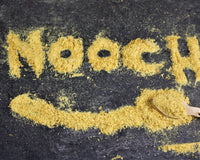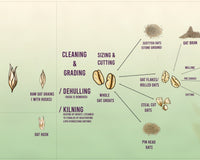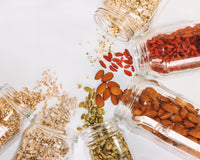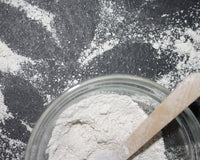Are Chia Seeds Good for You? | 10 Health Benefits of Chia Seeds
Yes, for those who want a quick answer, Chia Seeds are most likely good for you.
Chia Seeds are one of the plant-based foods that contain one of the most significant amounts of fibre and omega-3 fatty acids. They abound in copious amounts of high-quality protein, along with several antioxidants and essential minerals. These may improve blood levels of heart-healthy omega-3s, digestive health, as well as any risk factors for heart disease and diabetes. Read on for all of this and more if you'd like answers as to why Chia Seeds could be precisely what you need.
Chia Seeds Are Easy to Incorporate Into Your Diet
Chia seeds themselves are quite bland, making them an easy add on to pretty much anything. A massive bonus of them is they don't need to be ground up like flax seeds do. Making them so much easier to prepare. Chia seeds can be eaten raw, added to porridge, puddings, smoothies, soaked in juice or different kinds of milk, or added to baked goods.
You can also pepper them on top of different rice dishes and vegetables. However, the most popular way Chia Seeds are incorporated into diets is by sprinkling them on cereals, yoghurts and granolas.
Chia Seeds have the fantastic ability to absorb both water and fat. This special trait can thicken sauces in recipes and as egg substitutes in certain baking recipes. A good supplement of chia seeds to recipes will dramatically boost their nutritional value. Chia Seeds do seem to be well tolerated throughout, but if you're not used to eating a lot of fibre, there is a chance of experiencing digestive side effects if too much of it is eaten all at once.
Chia Seeds Deliver a Massive Amount of Nutrients With Very Few Calories
Chia Seeds are tiny black, white or grey seeds from the plant Salvia Hispanica, which form part of the mint family.
Don't be fooled by the size — these tiny seeds pack a mighty nutritional punch.
Fibre: 11 grams.
Protein: 4 grams.
Fat: 9 grams (5 of which are omega-3s).
Calcium: 18%
Manganese: 30%
Magnesium: 30%
Phosphorus: 27%
Chia seeds also contain a decent amount of zinc, Niacin
(vitamin B3), thiamine (vitamin B1), potassium, and vitamin B2.
This is a particularly impressive nutritional profile considering it is just 28 grams or about two tablespoons worth. Making them one of the world's best sources of many important nutrients.
Chia Seeds Are Chock Full of Antioxidants
Another area where Chia Seeds excel is in their high antioxidant content. These essential antioxidants protect sensitive fats in the seeds, preventing them from going rancid. Most importantly, antioxidants fight the production of free radicals, which can damage cell molecules and contribute to ageing and several diseases such as cancer. Chia Seeds provide high amounts of many minerals, the highest of which is the mineral Selenium, involved in several processes in the body. Chia Seeds also contain several beneficial plant compounds such as Kaempferol. This antioxidant has been correlated with a risk decrease for cancer and other chronic diseases. Chia Seeds are also abundant in Chlorogenic acid, an antioxidant with possible links to blood pressure regulation. Quercetin is another antioxidant found in Chia Seeds. This powerful antioxidant may reduce the risk of heart disease, certain forms of cancer, and osteoporosis.
Almost All Carbs in Chia Seeds Are Fibre
By weight alone, Chia Seeds are one of the most prominent sources of fibre in the world. A single ounce (28 grams) of Chia Seeds contains 12 grams of carbs. Yet, 11 out of those 12 are actually fibre! The body does not process fibre; it does not raise blood sugar or require insulin to be disposed of. Though fibre belongs to the carbohydrate family, its health effects are abundantly different from digestible carbs such as starches and sugars as Chia Seeds' carb content is very low. This makes Shia a low-carb friendly food.
Due to its high soluble fibre content, Chia Seeds can absorb up to 12 times their weight in water! The result is a gel-like substance expanding in your stomach. This special attribute of Chia Seeds theoretically leads to an increased sense of fullness. This suggests a slow absorption of food and may help people eat fewer calories. Another positive aspect of Chia Seeds' fibre content is its aid in feeding the friendly flora/bacteria residing in the gut.
Chia Seeds Contain High-Quality Protein
Chia Seeds contain a decent amount of protein. Calculated by weight alone, they are made up of about 14% protein. A very high protein profile content when compared to most plants. Chia Seeds also have a good balance of essential amino acids; this should make it easier for the body to make use of its protein content.
Protein has several health benefits and is renowned as the friendliest weight loss dietary nutrient. A high protein intake diet has been shown to lower appetite and reduce obsessive thoughts about food and the desire to go for a midnight snack. Chia Seeds truly are an excellent protein source, especially for those who eat little to no animal products. However, Chia Seeds are not recommended as a sole source of protein for children.
Chia Seeds May Help With Weight Loss
Most people don't consume enough fibre from their diets. A high fibre intake is closely linked to improved gut health whilst helping to lower the risk of numerous diseases. Given their impressive water-absorbing capacity, Chia Seeds increase the volume of foods in the digestive tract. This leads to an increased sensation of fullness which in turn lowers food intake. As such, Chia Seeds have become a popular aid in weight loss.
The soluble fibre content in Chia Seeds absorbs large amounts of fat and water and expands in the stomach. The increased 'fullness' helps slow the absorption of food, leading to a prolonged sense of satiety. Though the incorporation of Chia Seeds into your diet is unlikely to promote weight loss by itself. Experts believe Chia Seeds can be a useful addition as a weight loss aid.
Chia Seeds Increase Blood Levels of Omega-3 Fatty Acids
Much like flax/linseeds, Chia Seeds have a very high omega-3 fatty acid profile. So high, in fact, that Chia Seeds contain more omega-3s than salmon! However, it's worth noting that Omega-3s in Chia Seeds are mostly alpha-linolenic acid (ALA); these are not as beneficial as we may think. ALAs need to be converted into their active forms, docosahexaenoic acid (DHA) and eicosapentaenoic acid (EPA), before the body can make proper use of it. Alas, the human body is inefficient at converting ALA into its active forms. Thus, plant-derived omega-3s usually tend to be vastly inferior to animal sources like fish oil. A plant-sourced DHA supplement might be the answer for the brain and body to receive the required DHA amounts.
Chia Seeds May Lower Risk of Heart Disease
Given that Chia Seeds are a high fibre, protein, and omega-3 profile, they are possible to reduce the risk of heart disease. Research suggests that omega-3s may decrease the risk of thrombosis and arrhythmias. These are known disorders that can lead to heart attack, stroke, and sudden cardiac arrest. A few studies seem to show that Chia Seeds significantly reduce blood pressure in people who suffer from hypertension. A strong risk factor for heart disease. Overall, Chia Seeds may be likely to benefit heart health. However, it's not likely to have major effects unless coupled with other beneficial lifestyle and dietary changes.
They're High in Important Bone Nutrients
Chia Seeds contain high levels of several essential nutrients used to build strong bones.
Calcium — Calcium is a mineral directly involved in the process of bone formation and its maintenance. Calcium is the most prevalent mineral in skeletons, so it's crucial for building bone. Calcium also facilitates the transport of oxygen throughout your body, making it indispensable for cardiovascular health as well.
B Vitamins — The B Vitamins work together to provide multiple benefits, from proper nervous system function to the production of red blood cells and immune cells to protein metabolization.
Manganese — Manganese is a primary antioxidative enzyme. It mainly protects cells from oxidative damage and free radicals. It also contributes to collagen production. Meaning, manganese is essential to the creation of building blocks for both skin and bones.
Magnesium — Magnesium plays a role in over 300 processes throughout the body. Those processes include regulation of the parathyroid gland. A gland that controls the mineralization of new bone. As magnesium is a significant component of the bone matrix, it regulates mineralization whilst being one of the minerals present in the bone-building process.
Improved Blood Sugar Control
Some animal studies suggest that Chia Seeds may boost insulin sensitivity and blood sugar control. A high blood sugar level is a typical symptom of type 2 diabetes going untreated.
Consistent high fasting blood sugar levels are often associated with an increased risk of chronic diseases and heart disease. Further, temporary blood sugar level spikes after meals could also have adverse health effects if extremely high and occurring regularly.
There are a few human studies that support Chia Seeds as a viable alternative for blood sugar control. However, a study showed that eating bread that contained Chia Seeds lowered the post-meal blood sugar level rise. When compared to bread that did not include any Chia Seed.
In conclusion, Chia Seeds are not only rich in nutrients, antioxidants and fibre but are also incredibly easy to prepare. Being most commonly added to porridge or smoothies.
Some studies suggest they have a plethora of health benefits, from weight loss to heart disease.
If you didn't eat Chia Seeds already, you should definitely consider it. After all, they're among the few superfoods worthy of the title






